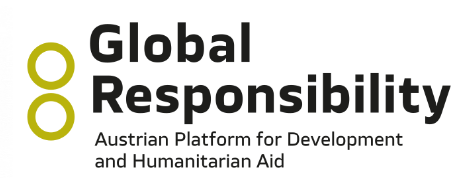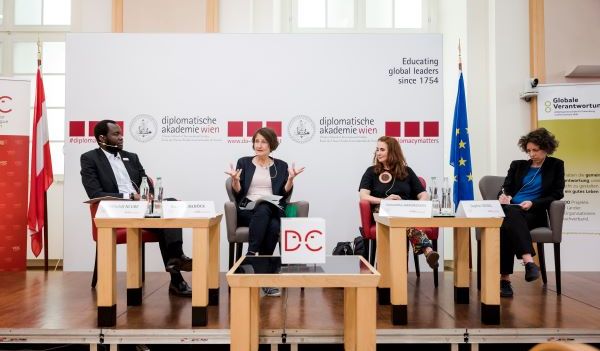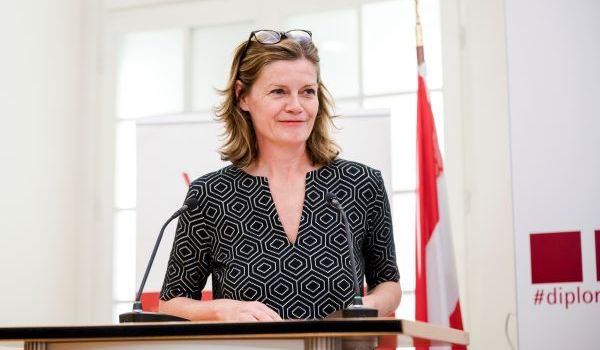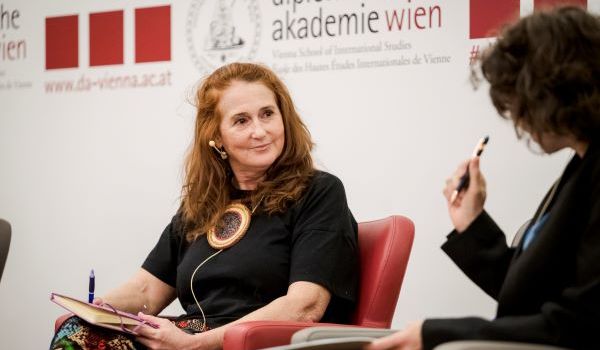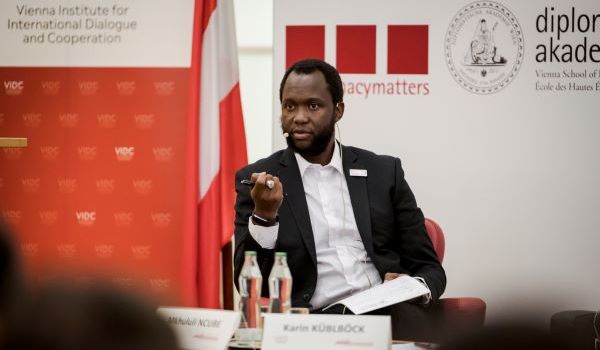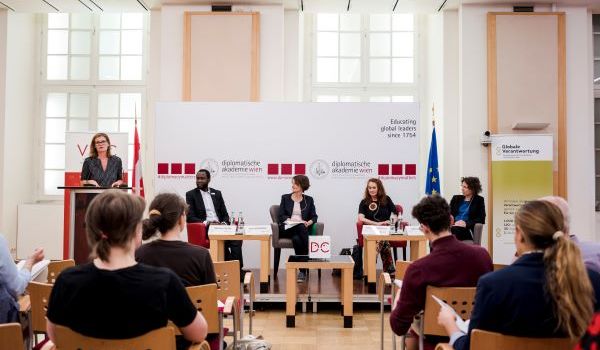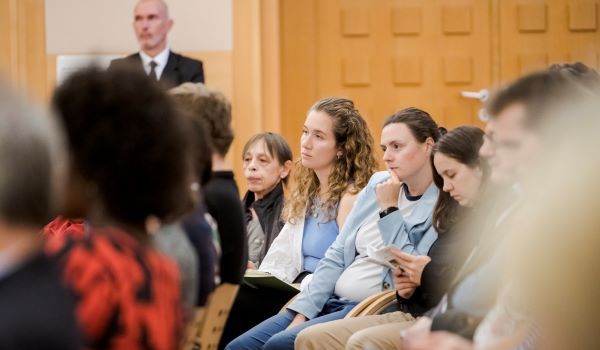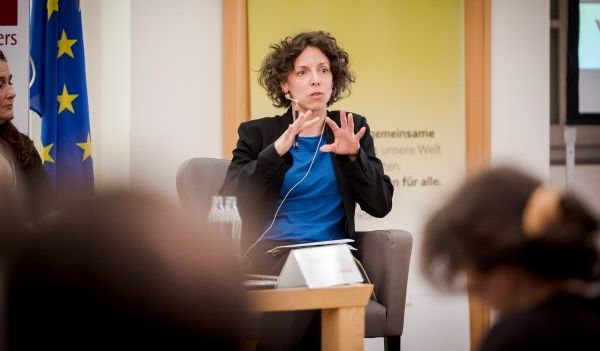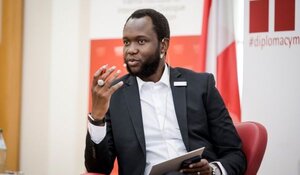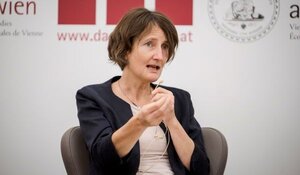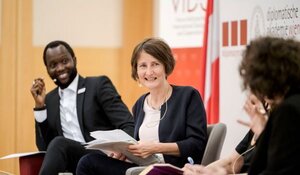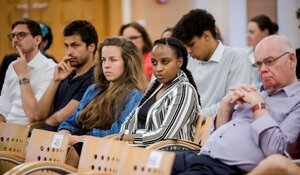The panel discussion revolved around the renewed interest of the European Union in the African continent as an important supplier for so-called “critical raw materials”, used in the technologies that are needed for a green economic transition, like solar panels or wind turbines. Welcoming remarks of Sybille Straubinger, director of the VIDC, and a brief introduction by Sophie Vessel (Global Responsibility) who provided the event’s topical outline, were followed by a lively discussion between panelists Mkhululi Nkosilamandla Ncube of the African Minerals Development Centre (AMDC) of the African Union, Samantha Hargreaves of the WoMin African Alliance and Karin Küblböck of the Austrian Foundation for Development Research (ÖFSE), and complemented by questions of the audience.
The Africa Mining Vision: Minerals in exchange for development
Following the prelude to the discussion, Ms. Vessel asked Mr. Ncube about his views on the role of critical raw materials for the economic development of African countries and the possibilities for European development actors to play a supportive role for them. Mr. Ncube pointed towards the Africa Mining Vision (AMV), a non-binding roadmap for mineral extraction for the states of the African Union, whose implementation the African Minerals Development Center (AMDC) is helping to control and coordinate. Furthermore, he reminded the audience of the underlying historical context of the current situation, referring to frequent and successful European attempts of hampering economic development in Africa. For Mr. Ncube, the EU’s policies on critical raw materials show the intent of renewing colonial cycles of exploitation and subordination by exploiting Africa’s mineral resources. Those cycles need to be stopped, also by altering the narratives. In the case of mineral extraction, African countries and communities want to build up their own battery processing and recycling capabilities, which shows f.ex. a current Zambian-DR Congo initiative. These complex industries do not yet exist, and their build-up should be supported, instead of waiting for the green minerals to be exported unprocessed to Europe. There should be a general will to support that should feed concrete EU policies, not least because Europe was developed on the back of African minerals.
It was such a historical sensibility that lead to the main goal of the AMV which, briefly summarized, is to use own resources in the best way possible – just as much for the ones affected by the extraction as for the ones who are extracting them. Therefore, Ncube closed, the AMV could be understood as an “Industrialization Framework”, proposing to integrate mining better into infrastructure and industrial development.
African Perspectives on an economic cooperation with the EU
Asked about the difference between green or brown extractivism, potential benefits for local communities and which possibilities the EU’s Green transition might offer Africa, Samantha Hargreaves used a similar line of argumentation as Mr. Ncube. For her, colonial practices have continued to exist long after colonialism had formally ended. As economic inequality prevails, not by accident but rather because of the unequal terms of trade between the two continents, real sovereignty remains a “distant dream” for African states. Deals with European countries were almost never fair. She cited examples of huge European multinational companies, backed by their home countries, putting pressure on small African countries, as well as cases of fraud and corruption such as that of the Lesotho Highland Waters Project. Ms. Hargreaves agreed with Mr. Ncube with regards to the lack of financial resources, due to power imbalances. She explained that the European colonial powers left the newly independant states highly indebted. The ‘sovereign’ administrations of postcolonial African countries were and are continually pressured into unfavourable political and economic cooperations with the West. In cases such as Zimbabwe, debt was incurred for infrastructure projects that by and large mainly benefitted European interests. The debts were used to coerce the country into opening up its markets as well as privatizing its public assets and limiting cooperation with other African countries. This must be overcome, as otherwise true independence is not possible. Ms. Hargreaves pleaded for Pan-African solutions to withstand external pressures. Such a Pan-African solidarity should also be built bottom-up, between people and movements.
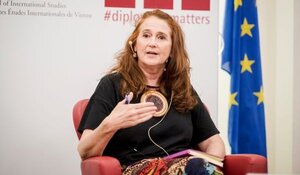
According to Ms. Hargreaves, local structures and practices, like customary tenure systems, should be taken into account. As in many places the historical use of common land by communities is not acknowledged legally, and as land titles are often lacking, involuntary displacement of people caused by extractivist projects is easy and happens regularly – without compensation. Taking local circumstances into account could be done, firstly, in form of a dialogue on the basis of free, prior and informed consent and, secondly, by ensuring that promises made are fulfilled. These principles should also be valid for renewable energy projects, as it can already be seen that, as with ‘brown’ projects, local people pay the costs but do not benefit themselves.
The European Critical Raw Materials Act: A continuation of extractivist narratives and approaches?
Having already discussed the African perspectives on a continental, national and communal level, Karin Küblböck completed the view on critical mineral extraction through her analysis of an important international actor: the EU, more specifically the EU’s raw material policy, which comprises of trade policy but also other policies like planning, research and development or technology policy – all of them not common EU but national or even regional policies. After China’s demand for raw materials grew in the 2000s, the EU began to formulate its own strategy in 2008. The initiative aimed at gaining “undistorted access” to resources under the imperative of “free trade”. Since then, raw materials have become crucial for the green transition as well as for digitalisation and military purposes. This resulted in an expanding EU list of “critical raw materials” that since its original conception in 2011 has more than doubled, from 14 to 34. They are considered critical because access to them cannot be secured and because they are important for EU industries. Their importance is also underlined by the fact that the original non-binding strategy has now become a (draft) binding legislative act whose objectives go beyond securing access to raw materials in other countries. With this act, the EU wants to become more independent, for example by diversifying imports, and it wants to bring back industrial production to the EU. Moreover, “strategic” raw materials are singled out, linking them with so-called “strategic projects” in and outside the Union. Those projects are of higher importance to the Union, will be easier to implement and might get favourable financing conditions.
For Ms. Küblböck, the EU Commission’s draft of a “Critical Minerals Act” shows that the race for those minerals has become a pressing issue. She fears that at the end the EU’s path only leads to minerals extracted and shipped to Europe, without adding value to local (African) economies. A pathway that, for her, has at least two major flaws: Firstly, the urgent necessity to decrease European energy consumption is not mentioned when, on the other hand, 600 million Africans do not have access to energy, and when 60 % of all critical raw materials in Europe would only be needed for car battery production. Secondly, the EU conceived its strategies without entering into a dialogue on equal terms with those who are affected by it, the African Union, its member states and local communities.
With regards to the Europe-Africa narratives apparent in the policy draft, Ms. Küblböck recognized a continuation of colonialism, just as her co-panelists. Enriching Ms. Hargreaves’ perspective, she explicated some of the mechanisms generally used to coerce African countries into cooperation – the keyword here being “(lost) policy space”. According to Ms. Küblböck, many of the international trade measures from the 1990’s and 2000’s, an era of nearly uninhibited free trade, continue to limit the policy space of African countries. Due to bilateral trade and investments treaties, multinational companies are able to sue countries for different policy measures, even climate policies. A conflict between unequal partners, as multinationals often have far more financial resources than small, economically weak countries. Accordingly, while European and North American countries now introduce more and more protective measures to build up their industries again, African countries are prohibited to do so, and as a result they remain in perpetual dependency.
In the following discussion these contradictions were taken up once more by the audience, when it was asked why there is no common mineral platform, like there is OPEC for oil. Mr. Ncube conceived this to be unrealistic for Africa at the moment but pointed at an initiative of “the willing” (including the African Development Bank, African Export Import Bank, or UNECA) to develop an African Green Minerals Strategy. When African perspectives in its cooperation with China were mentioned, Mr. Ncube stated frankly, that the relation between Africa and Europe, also from a historic perspective, is seen as being the one “of a horse and a rider” while Africa and China are seen as “comrades” in a joint fight. So Europeans should not compare themselves directly with China because then they already would have lost. With regards to problems with reaching African unity, Ms. Hargreaves underlined that this is difficult as long as African countries have to compete against each other for foreign investments. Finally, she called out for a critical alignment of diverse civil society movements between Europe and Africa, to work on and call for solutions who benefit people in Europe as well as in Africa and other parts of the world.


